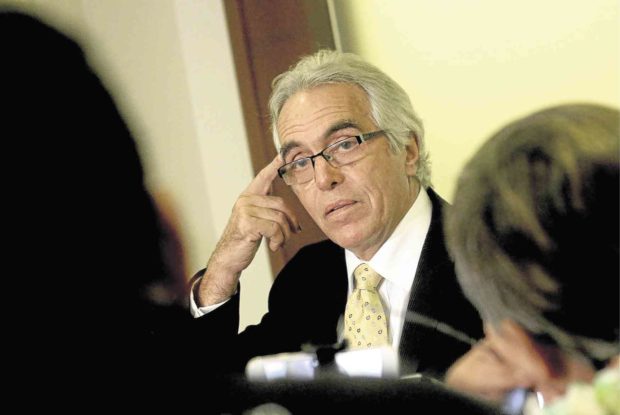Sereno ouster worries UN expert; he’s misinformed, says Palace

Diego Garcia-Sayan, UN special rapporteur on the independence of judges and lawyers, in a press conference in Makati City on Thursday —RICHARD A. REYES
A UN human rights expert has expressed grave concern about the country’s judicial independence following the dismissal of Supreme Court Chief Justice Maria Lourdes Sereno last month, saying her ouster sent a “chilling message” to other members of the judiciary and could lead to the “deterioration of the rule of law.”
In an interview with reporters at Manila Polo Club in Makati City late on Thursday afternoon, Diego Garcia-Sayan, UN special rapporteur on the independence of judges and lawyers, said that based on his observations, the independence of the judiciary and the rule of law in the Philippines were being “liquidated” following President Duterte’s public attacks against Sereno and the filing of the quo warranto petition against her.
SC decision
On May 11, the Supreme Court voted 8-6 to remove Sereno as Chief Justice, saying she had failed an “integrity test” for not filing some of her statements of assets, liabilities and net worth when she was being considered for the post in 2010.
“The decision of the Supreme Court was issued two days after the President of the Philippines publicly threatened the Chief Justice by saying that she was his enemy and that she should be removed from her job or resign,” Garcia-Sayan said.
Article continues after this advertisementArticle continues after this advertisement
‘Derogatory language’
On April 13, Mr. Duterte called the Chief Justice “ignorant,” “dumb” and a “coward” after recalling how Sereno had called on judges, whom the President had publicly declared to be involved in illegal drug activities, not to surrender to authorities unless arrest warrants were issued against them.
The President was quoted as saying of Sereno: “You really should be removed. You should have been removed way before. You are dumb. Your mother is a whore. Give way. If I were you, I will resign.”
“The use of such derogatory language against the highest-ranking magistrate in the country sends a clear message to all judges of the Philippines: in the so-called war on drugs, you’re either with me or against me,” the UN expert said.
Palace points to CJ colleagues
Garcia-Sayan called for the reversal of the Supreme Court decision that ousted Sereno and for the continuation of the impeachment process to address questions about the validity of her appointment.
On Friday, Malacañang said it was unfortunate that Garcia-Sayan had been “misinformed” about Sereno’s case, with presidential spokesperson Harry Roque saying that “the President’s dislike of the ousted Chief Justice [was] not an attack [on] the judiciary or an affront to judicial independence.”
The President, he added, recognized and respected the independence of the Supreme Court, as well as the separation of powers among the three branches of government.
“It [was] ex-CJ Sereno’s colleagues, associate justices known for their independence and unassailable integrity, who voted for her to be ousted,” Roque said.
Academic visit
Garcia-Sayan, who said he was in the country for an “academic visit,” maintained that he was not meddling in the country’s internal affairs but felt “morally [and] ethically obliged” to speak about the situation in the country because of his job as a UN rapporteur.
There are international standards pertaining to judicial independence that must be complied with by the world community, he added.
Appointed UN special rapporteur in 2016, Garcia-Sayan was Peru’s former foreign and justice minister during his country’s transition to democracy following the ouster of longtime President Alberto Fujimori.
Checks and balances
He is currently a member of the Permanent Court of Arbitration in The Hague, Netherlands, and of the Washington-based think tank Inter-American Dialogue.
Garcia-Sayan warned that based on his experiences as a Latin American and as UN rapporteur, interference in judicial independence would result in the degradation of the principle of checks and balances in the government and ultimately lead to authoritarian rule.
“Checks and balances is not a question of lawyers and academia; it is a question of the daily democratic rights of society,” he said.
The UN expert said he had relayed his concerns to the Philippine government and would continue following up events related to this sensitive matter.